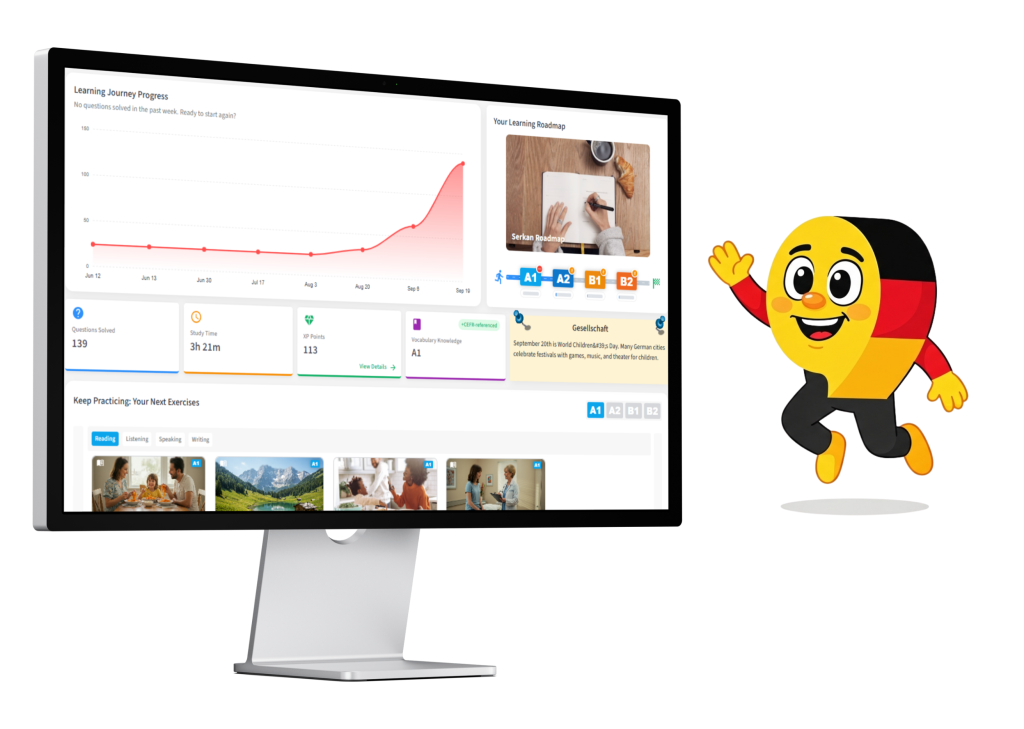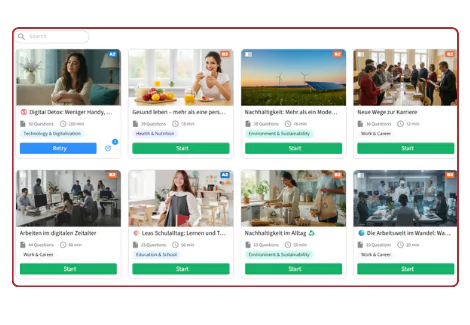Table of Contents
Introduction
Chapter 1: Why you need a German language certificate
1.1. Academic pursuits: Gaining admission to German universities
1.2. Career advancement: Unlocking professional opportunities
1.3. Immigration and residency: Fulfilling official requirements
1.4. Personal development: Benchmarking your linguistic competence
Chapter 2: The 3 pillars of German assessment: Goethe, Telc, and TestDaF
2.1. The Goethe-Institut: The global cultural ambassador
2.2. Telc GmbH: The pragmatic, communications-focused standard
2.3. The TestDaF-Institut: The academic gateway to higher education
Chapter 3: The CEFR framework
A1/A2: Basic user
B1/B2: Independent user
C1/C2: Proficient user
Identifying the appropriate level for your goals
Chapter 4: In-depth analysis of the examinations
4.1. The Goethe-Zertifikat (A2-C2)
Structure (Lesen, Hören, Schreiben, Sprechen)
Evaluation criteria and focus
Ideal candidate profile
4.2. The Telc Deutsch Certificate (A2-C2)
Structure and key differences from Goethe
Evaluation criteria and focus
Ideal candidate profile
4.3. The TestDaF Examination (Levels B2-C1)
Academic structure and content
The unique scoring system (TDN 3, 4, 5)
For whom is this exam essential?
Chapter 5: Comparative analysis: Quick-reference “Fact sheets”
Choosing the right exam for your goal:
University admission: TestDaF vs. Telc C1 Hochschule vs. Goethe C2
Citizenship/residency: Why Telc and Goethe are the primary choices
Global recognition: The universal prestige of the Goethe-Institut
Oral examination format: Paired vs. individual assessments
Chapter 6: A Strategic Preparation Roadmap from the A2 Level
6.1. Solidifying your foundation: Mastering A2 grammar and lexis
6.2. Building the bridge to B1: Your next strategic milestone
6.3. Exam-specific training methodologies
The Critical role of Model Tests (Official practice exams)
Time management and pacing strategies
Effective vocabulary acquisition techniques
6.4. Skill-building exercises for the four modules
Lesen (Reading): Sourcing appropriate materials
Hören (Listening): Developing auditory comprehension
Schreiben (Writing): Practicing for specific task types
Sprechen (Speaking): Overcoming reticence and building fluency
Table of Contents

Introduction
Hello, German learner! It is great that you are learning German. You know some German now. Maybe you want an official paper to show your German skills. This paper is called a certificate.
To get a certificate, you need to pass an exam. But there are different exams, like Goethe, Telc, and TestDaF.
Which exam is right for you? It can be confusing.
This guide is here to help. It is a simple map. It will show you the way. We will look at the three big exams. We will explain them clearly and easily.
This guide will help you understand:
- Why you need a certificate.
- Which exam is good for work.
- Which exam is good for university.
- Which exam is good for living in Germany.
These exams are not a problem. They are a helpful step for your future. With this guide, you can choose the best exam for your plan. Let’s begin!
Chapter 1: Why you need a German language certificate
While the intrinsic value of learning a new language is immense, the modern global landscape of academia, commerce, and law demands a standardized and verifiable measure of proficiency. A formal German language certificate—from a respected institution like the Goethe-Institut, Telc GmbH, or the TestDaF-Institut—transforms your linguistic ability from a subjective claim into a quantifiable, internationally recognized asset. This chapter details the critical domains where such certification is not just advantageous but often an absolute prerequisite for progress.
1.1. Academic pursuits: Gaining admission to German universities
While the intrinsic value of learning a new language is immense, the modern global landscape of academia, commerce, and law demands a standardized and verifiable measure of proficiency. A formal German language certificate—from a respected institution like the Goethe-Institut, Telc GmbH, or the TestDaF-Institut—transforms your linguistic ability from a subjective claim into a quantifiable, internationally recognized asset. This chapter details the critical domains where such certification is not just advantageous but often an absolute prerequisite for progress.
1.2. Career advancement: Unlocking professional opportunities
In the professional sphere, a language certificate serves as a powerful differentiator. It provides Human Resources departments and hiring managers with a reliable third-party validation of your skills, setting you apart from candidates who simply list “Proficient in German” on their curriculum vitae.
This credential is vital in several contexts:
- For regulated professions: Fields such as medicine, law, and education in Germany require a high level of language proficiency (often C1 or C2) for licensure (Approbation). An official certificate is a mandatory component of the credentialing process.
- In the German job market: For any skilled position, employers expect a minimum of a B2 level to ensure you can integrate into a team, understand workplace safety protocols, and communicate effectively with colleagues and clients. For customer-facing or management roles, a C1 is often the standard.
- With multinational corporations: Companies with German business ties, whether in your home country or abroad, value employees who can communicate seamlessly with German-speaking stakeholders. A certificate proves you are an asset for international projects, negotiations, and client relations, opening doors to promotions and overseas assignments.
A certificate effectively translates your language skills into a concrete business advantage, demonstrating your commitment and capability in a way that self-assessment cannot.
1.3. Immigration and residency: Fulfilling official requirements
For individuals seeking to live in Germany, language proficiency is a cornerstone of social integration and a legal requirement for most visa, residency, and citizenship applications. The German authorities (Ausländerbehörde) require specific certificates as official evidence.
The required levels are tied directly to the legal purpose:
- Family reunification visa (Visum zum Familiennachzug): A spouse joining their partner in Germany must typically demonstrate basic communicative skills with an A1 certificate, such as the Goethe-Zertifikat A1: Start Deutsch 1. This proves an ability to handle simple, everyday interactions.
- Permanent residence permit (Niederlassungserlaubnis): To obtain the right to live in Germany indefinitely, applicants generally need to prove B1 proficiency. The Goethe-Zertifikat B1 or, very commonly, the Telc Deutsch B1 certificate is the standard. This level indicates you can manage most situations independently in daily life.
- German citizenship (Einbürgerung): The path to becoming a German citizen also requires a demonstrated B1 level of German, proving your ability to participate in the social and political life of the country.
In these bureaucratic processes, there is no room for ambiguity. An official certificate is the only accepted form of proof.
1.4. Personal development: Benchmarking your linguistic competence
Beyond external requirements, pursuing a certificate offers a structured and highly effective framework for your language learning journey. The process itself yields significant benefits.
Preparing for a standardized exam compels you to develop all four core competencies (vier Fertigkeiten) in a balanced way: reading (Lesen), listening (Hören), writing (Schreiben), and speaking (Sprechen). This prevents the common pitfall of developing strong passive skills (reading/listening) while neglecting active production (writing/speaking).
Furthermore, the exam serves as a powerful diagnostic tool. A formal test result provides you with an objective assessment of your strengths and weaknesses, allowing you to focus your future studies more effectively. The clear, time-bound goal of an exam date provides powerful motivation, turning casual study into a focused and disciplined endeavor. Finally, the achievement of passing a rigorous, internationally respected exam is a profound confidence booster, marking a significant milestone in your personal and intellectual development.

Chapter 2: The three pillars of German assessment: Goethe, Telc, and TestDaF
Learning German is not only about speaking — it is also about proving your skills in a trusted and official way. Three main institutions test and certify German language ability:
The Goethe-Institut, Telc GmbH, and The TestDaF-Institut. Each one has a special purpose, target group, and testing style. Let’s look at them one by one.
2.1 The Goethe-Institut: The Global cultural ambassador
The Goethe-Institut is Germany’s official cultural and language organization. It promotes the German language and culture worldwide. There are more than 150 Goethe centres in over 90 countries.
Purpose and reputation
The Goethe-Institut exam is often seen as the most prestigious German language certificate. Universities, companies, and governments accept it. It represents German culture, education, and communication quality.
Exam System
Goethe exams follow the CEFR system from A1 to C2. Each level has a special goal:
- A1–A2: everyday communication
- B1–B2: working and studying in German
- C1–C2: professional and academic mastery
Level | Skill focus | Typical use |
A1 | Basic phrases and greetings | Family reunion, beginner learners |
A2 | Simple daily communication | Everyday life, entry jobs |
B1 | Independent communication | Citizenship, integration |
B2 | Professional and academic readiness | Work, advanced learning |
C1 | Fluent academic and professional German | University study, formal jobs |
C2 | Near-native mastery | Teaching, translation, research |
Special Strengths
- Globally accepted and officially trusted.
- Focus on language accuracy and cultural understanding.
- High-quality testing and fair evaluation.
- Suitable for students, professionals, and migrants who need proof of language level.
2.2 Telc GmbH: The pragmatic, communications-focused standard
Telc means “The European Language Certificates.” It is a modern testing system used by many adult education centres (VHS) in Germany and Europe. Telc focuses on practical communication and real-life situations.
Purpose and use
Telc exams are used for:
- Integration and citizenship applications,
- Job and residence permits,
- And vocational German (for nurses, doctors, etc.).
There are also special versions, like Telc Deutsch B1 + Beruf (for work) and Telc C1 Hochschule (for university).
Structure and Focus
Telc tests the same four skills as Goethe but has a different style. The tasks are more situation-based. For example:
- Reading: understanding a train schedule or an email.
- Listening: short messages or phone conversations.
- Writing: replying to a letter or describing a problem.
- Speaking: small dialogues or role-plays.
Telc wants to see how you use German in everyday life, not just grammar rules.
Special Strengths
- Focuses on communication, clarity, and confidence.
- Easier to find test dates in local education centres.
- Often faster to receive results.
- Many integration courses in Germany finish with a Telc exam.
2.3 The TestDaF-Institut: The academic gateway to higher education
The TestDaF-Institut is a specialized organization that tests academic German. Its main exam, TestDaF (Test Deutsch als Fremdsprache), is needed if you want to study at a German university. It is more advanced — usually for B2 to C1 levels.
Purpose and Target Group
TestDaF is designed for:
- International students who need German for university.
- Researchers and academics who use German in their work.
- Anyone needing to prove academic communication skills.
Structure and Content
TestDaF has four parts:
- Reading – understanding academic texts.
- Listening – understanding lectures or university talks.
- Writing – producing essays, summaries, or reports.
- Speaking – giving short academic presentations or answers.
Each part is graded from TDN 3 to TDN 5:
- TDN 3: Minimum for university entry (some programs).
- TDN 4: Accepted by most universities.
- TDN 5: Excellent, near-native level.
Special Strengths
- Recognized by all German universities.
- Focused on academic and scientific language.
- Computer-based exam available (TestDaF digital).
- Same exam worldwide on the same date — very standardized.
2.4 Summary: Three Paths to Success
Institution | Focus | Level range | Best for |
Goethe-Institut | Cultural, global, precise | A1–C2 | International learners & professionals |
Telc GmbH | Practical, daily, job-related | A1–C2 | Residents, workers, integration learners |
TestDaF-Institut | Academic, university-level | B2–C1 | Students & researchers |
Each exam is a pillar of German assessment. They all share one goal: to help you prove your German ability in a way that matches your dreams and future plans.

Chapter 3: The CEFR Framework
To understand exams like Goethe, Telc, or TestDaF, we first need to understand the CEFR.
CEFR means Common European Framework of Reference for Languages. It shows how well a person can use a language — not only what grammar or words they know.
The CEFR has six levels:
- A1 – A2 (Basic user)
- B1 – B2 (Independent user)
- C1 – C2 (Proficient user)
Each level describes what you can do in real communication: speaking, listening, reading, and writing.
A1 / A2: Basic user
At the basic level, you can understand and use simple German for daily life. You can introduce yourself, ask simple questions, and talk about familiar things.
A1 Level – “The beginner”
Skill | What you can do | Example |
Reading | Understand short texts, signs, or forms (like “Supermarkt Montag – Samstag 9:00–18:00”). | You can find information on a timetable or menu. |
Listening | Understand slow, clear speech about familiar topics. | You can understand “Woher kommen Sie?” or “Wie alt sind Sie?”. |
Writing | Fill in forms, write very short sentences about yourself. | “Ich heiße Anna. Ich wohne in Berlin.” |
Speaking | Use basic words and expressions to talk about name, age, nationality, and daily life. | You can ask: “Woher kommst du?” and answer: “Ich komme aus der Türkei.” |
💡 Expert Tip: At A1, focus on polite phrases and clear pronunciation. Don’t worry about mistakes — focus on communication.
A2 Level – “The everyday communicator”
Skill | What you can do | Example |
Reading | Understand short messages, letters, or ads. | You can read a note from your teacher or a restaurant menu. |
Listening | Understand simple information in public places (bus, shop, radio). | “Der Zug nach Köln fährt um 10 Uhr.” |
Writing | Write short personal letters, messages, or descriptions. | “Ich kann heute nicht kommen, weil ich krank bin.” |
Speaking | Talk about your life, work, hobbies, and plans. | “Am Wochenende fahre ich nach Hamburg.” |
💡 Expert Tip: At A2, learn to combine short sentences with und, aber, weil. Example: “Ich arbeite viel, aber ich habe Spaß.”
B1 / B2: Independent user
At this level, you can use German with more confidence. You can understand the main points of normal speech and can express opinions, feelings, and experiences.
B1 Level – “The independent speaker”
Skill | What you can do | Example |
Reading | Understand everyday texts about work, school, or travel. | You can read a short newspaper article or blog. |
Listening | Understand main ideas in radio programs or daily conversations. | You understand “Heute sprechen wir über deutsche Feiertage.” |
Writing | Write connected text on familiar topics. | “Ich finde Sport wichtig, weil es gut für die Gesundheit ist.” |
Speaking | Talk about plans, opinions, and experiences in simple detail. | “Ich möchte in Deutschland studieren, weil ich Medizin liebe.” |
💡 Expert Tip: Use connectors like weil, deshalb, trotzdem, obwohl to make your speech more fluent.
B2 Level – “The confident communicator”
Skill | What you can do | Example |
Reading | Understand longer and more complex texts. | You can read news, job ads, or study materials. |
Listening | Follow extended speech or TV shows, even if not familiar. | You understand “In dieser Diskussion sprechen wir über Umweltschutz.” |
Writing | Write clear, detailed texts and reports on various topics. | “Viele Menschen denken, dass Technologie das Leben einfacher macht, aber es gibt auch Probleme.” |
Speaking | Talk fluently about personal and abstract topics. | “Ich glaube, dass Reisen wichtig ist, weil man neue Kulturen kennenlernt.” |
💡 Expert Tip: At B2, focus on natural expressions and collocations (like eine Entscheidung treffen, Erfahrungen sammeln).
C1 / C2: Proficient user
At this level, you can use German professionally or academically. You understand long and complex ideas and can express yourself fluently and precisely.
C1 Level – “The advanced communicator”
Skill | What you can do | Example |
Reading | Understand long, difficult, or technical texts. | You can read academic articles or reports. |
Listening | Follow long speeches, discussions, or university lectures. | You understand lectures about economics or culture. |
Writing | Write structured essays or formal reports with clear arguments. | “In diesem Text möchte ich die Vor- und Nachteile von Online-Unterricht diskutieren.” |
Speaking | Speak fluently and spontaneously with logical structure. | “Ich bin der Meinung, dass Bildung der Schlüssel zur Integration ist.” |
💡 Expert Tip: Practice academic writing and learn formal phrases such as zum Beispiel, einerseits – andererseits, abschließend.
C2 Level – “The Mastery Level”
Skill | What you can do | Example |
Reading | Understand everything, even complex or literary texts. | You can read philosophy, research, or classic German literature. |
Listening | Understand any kind of spoken German easily. | You can follow discussions, debates, or theatre plays. |
Writing | Write clear, structured, and elegant texts in any style. | “Die Sprache ist nicht nur ein Kommunikationsmittel, sondern auch ein Spiegel der Kultur.” |
Speaking | Express ideas fluently, precisely, and naturally. | You can discuss complex issues like science, culture, or politics. |
💡 Expert Tip: At C2, practice summarizing and interpreting complex ideas. Focus on tone and nuance.
Identifying the right level for your goals
Goal | Recommended level | Suitable Exam |
Daily life and simple communication | A1–A2 | Telc A1–A2, Goethe A1–A2 |
Long-term residence or citizenship | B1 | Telc B1, Goethe B1 |
Professional work or training | B2 | Telc B2, Goethe B2 |
University studies | C1 | TestDaF, Telc C1 Hochschule |
Teaching or research | C2 | Goethe C2 |
💡 Expert Advice: It is smarter to take the exam that matches your real skills than to choose a higher level too early. Every level is a step up, not a limit.

Chapter 4: In-depth analysis of the examinations
German exams have one goal: to prove your real language ability. But each exam tests you in a different way. In this chapter, we will look at the structure, evaluation, and purpose of each major German test — starting with the Goethe-Zertifikat.
4.1 The Goethe-Zertifikat (A2–C2)
The Goethe-Zertifikat is one of the most respected German language exams in the world. It is created by the Goethe-Institut, Germany’s official cultural organization. This certificate is accepted internationally for study, work, and immigration.
Structure of the exam
The Goethe exam has four main parts — the same from A1 to C2. Each part tests a different language skill.
Module | German Name | Description | Example task |
Reading | Lesen | You read short texts, letters, or articles and answer questions. | Match texts with topics or choose true/false answers. |
Listening | Hören | You listen to short conversations, radio shows, or announcements. | Choose correct answers or complete missing words. |
Writing | Schreiben | You write messages, emails, letters, or essays depending on level. | Write a reply to an email invitation or write an opinion paragraph. |
Speaking | Sprechen | You talk alone or with a partner. Tasks include introducing yourself, giving opinions, or discussing topics. | Describe a picture or give a short talk about your daily routine. |
Evaluation criteria and focus
Goethe examiners use very clear rules to grade your performance.
They look for:
- Accuracy: correct grammar and word order.
- Range: variety of vocabulary and expressions.
- Communication: if your message is understandable.
- Fluency and coherence: how naturally you speak or write.
The exam is scored out of 100 points, divided equally between the four modules. You need 60 points or more to pass. If you pass all parts, you receive an official Goethe-Zertifikat for that level.
Level by level: What to expect
Level | Focus | Tasks example | Who It’s For |
A2 | Everyday life communication | Write short messages, simple dialogues | New learners, basic users |
B1 | Independent conversation | Talk about plans, write connected texts | Residents, citizenship applicants |
B2 | Professional use | Discuss topics, write structured essays | Job seekers, university prep |
C1 | Academic and professional fluency | Understand complex texts, write reports | University students, professionals |
C2 | Mastery | Summarize and interpret any text | Teachers, researchers, translators |
💡 Expert Tip: From B1 and above, writing and speaking become more complex. You need to show opinions, reasons, and examples, not just short answers.
Ideal candidate profile
- A2–B1: Learners living or working in Germany.
- B2: Professionals or students preparing for higher study.
- C1–C2: Advanced users, researchers, or teachers of German.
The Goethe certificate is perfect if you want:
- An internationally recognized qualification.
- To study or work in a German-speaking country.
- To prove your academic or professional German.
Practical advice for preparation
- Use official practice materials
Goethe-Institut offers free sample tests online. Practice them under real exam conditions. - Study each skill separately
- For Lesen, read German newspapers or websites for learners.
- For Hören, listen to slow podcasts.
- For Schreiben, write one short text every day — even 5 sentences help.
- For Sprechen, practice daily phrases with friends or teachers.
- Understand the exam timing
Each part has a strict time limit (for example, 20–30 minutes per section). Practice managing your time efficiently. - Learn useful phrases for the oral exam
Examples:
- Ich denke, dass… (I think that…)
- Meiner Meinung nach… (In my opinion…)
- Ich bin nicht sicher, aber vielleicht… (I’m not sure, but maybe…)
- Simulate the real test
Take full practice exams. Speak and write under the same time pressure as the real test.
Goethe vs. Other Exams
Feature | Goethe | Telc | TestDaF |
Focus | Global, cultural, academic | Practical, communication | Academic, university |
Format | Individual speaking | Often paired speaking | Computer-based (digital) |
Certificate use | Global recognition | Integration, work | University admission |
Style | Formal and structured | Natural and interactive | Academic and analytical |
💡 Expert Summary:
Goethe = Cultural and international prestige. It is the exam for learners who want quality, reputation, and long-term recognition worldwide.
Common mistakes in the Goethe exam (and how to avoid them)
Mistake | Why it happens | How to fix it |
Writing too short answers | Nervousness or limited vocabulary | Practice longer sentences with connectors (weil, aber, deshalb) |
Speaking too fast or too quiet | Lack of confidence | Practice speaking slowly and clearly |
Ignoring instructions | Reading too fast | Always read each task twice before starting |
Grammar errors in writing | Not checking work | Use 1–2 minutes to review before submitting |
4.2 The Telc Deutsch Certificate (A2–C2)
Telc means “The European Language Certificates.” It is one of the most practical and popular exam systems for German. Telc exams are used in Germany and Europe for residency, jobs, and integration. They are made by Telc GmbH, a company supported by the German Adult Education Association (VHS).
Telc exams test real-life communication — what you can do with German, not just what you know.
Structure of the exam
Telc exams have four main parts — just like Goethe — but the format is more communication-based.
Module | German name | Description | Example task |
Reading | Lesen | You read short texts, letters, forms, or small articles. | Match texts to situations, answer true/false questions. |
Listening | Hören | You listen to short talks, conversations, or announcements. | Choose the correct option or fill in missing words. |
Writing | Schreiben | You write messages, short emails, or opinion texts. | Write a short reply to an invitation or describe a problem. |
Speaking | Sprechen | You talk with another candidate, often in a pair. | Role-play a situation like making a hotel reservation or discussing a plan. |
💡 Expert Tip: In the Telc oral exam, you always speak with a partner, not alone. This helps you show interaction and cooperation — a key skill in real communication.
Key differences from Goethe
Feature | Telc | Goethe |
Speaking format | Always paired | Often individual |
Focus | Real-life communication | Formal and academic tasks |
Evaluation | Task-based (can you handle daily situations?) | Accuracy and structure |
Exam style | Shorter tasks, faster rhythm | Longer and deeper texts |
Purpose | Integration, work, daily use | Study, official use, global recognition |
💡 Expert Insight: Telc is often preferred for immigration and citizenship, while Goethe is more international and used for universities or embassies.
Evaluation criteria and focus
Each Telc exam has a maximum score of 300 points, divided as follows:
- Written exam (Reading, Listening, Writing): 225 points
- Oral exam (Speaking): 75 points
You need at least 60% (180 points) overall to pass.
Examiners check:
- How well you understand information (Reading/Listening)
- How clearly and correctly you write (Writing)
- How naturally you communicate with your partner (Speaking)
💡 Expert Tip: In Telc, communication is more important than perfect grammar. You can make small mistakes if your meaning is clear.
Level by level: What to expect
Level | Focus | Tasks Example | Who It’s For |
A2 | Everyday life and basic communication | Write a message, fill a form, short dialogues | New learners or residents |
B1 | Independent communication | Write a personal letter, talk about experiences | For citizenship, integration courses |
B2 | Professional language use | Discuss opinions, write formal emails | Job seekers, professionals |
C1 Hochschule | Academic German for university | Read study texts, write essays, talk about academic topics | Students entering university |
C2 | Very advanced users | Write reports, argue complex topics | Experts, teachers, translators |
💡 Expert Tip: For C1 Hochschule, use formal phrases like einerseits / andererseits, zum Schluss, and learn academic connectors.
Ideal candidate profile
Telc is perfect for learners who:
- Live or work in Germany,
- Want citizenship or permanent residence,
- Need German for practical communication,
- Or want a clear, task-based exam that reflects daily life.
It is also ideal for people who like pair work and interactive tasks.
💡 Example: If you often speak German with colleagues or neighbours, Telc is the right test for you — it tests the German you use every day.
Practical advice for preparation
- Use Telc Übungstests (Practice Exams)
These show you the real format. Practice under time pressure. Look Test German for it. - Train your listening
Listen to short German radio clips or YouTube videos with subtitles. Practice writing short notes while listening. - Practice paired speaking
Find a partner and practice everyday dialogues:
- Ordering food
- Making appointments
- Asking for help
- Giving your opinion politely
- Writing practice
Write short messages or emails for real situations — for example:
“Ich möchte den Termin verschieben.”
“Können Sie mir bitte Informationen über den Kurs schicken?”
- Manage time well
Telc tasks are short but fast. Train yourself to finish each part on time.
Common challenges and solutions
Challenge | Why It Happens | How to Fix It |
Forgetting what to say in the oral exam | Nervousness | Prepare sentence starters (Ich denke, dass… / Meiner Meinung nach…) |
Writing too little | Not knowing connectors | Learn und, aber, weil, deshalb and use them in every sentence |
Listening too fast | Unfamiliar sounds | Practice daily with slow German audio |
Reading confusion | Not scanning for keywords | Underline important words in the text before answering |
Comparison: Telc vs. Goethe in practice
Situation | Recommended exam | Reason |
Applying for German citizenship | Telc B1 | Required by German authorities |
Studying at a German university | Goethe C1 or TestDaF | Recognized for academic entry |
Job in Germany (health, service) | Telc B1–B2 | Focus on workplace communication |
Moving to Germany for family reunion | Goethe A1 or Telc A1 | Both accepted for visa application |
💡 Expert Summary:
Telc = Real-life communication. It is practical, accessible, and focused on what you can do in real life — not just theory.
4.3 The TestDaF examination (Levels B2–C1)
The TestDaF (Test Deutsch als Fremdsprache) is a university-level German exam. It is made by the TestDaF-Institut in Germany and is accepted by all German universities. It tests if your German is strong enough to study or research in a German-speaking academic environment.
Purpose and target group
The TestDaF exam is designed for:
- Foreign students who want to study in Germany,
- Researchers and academics who use German in their work,
- And professionals who need academic-level German (for example, doctors or engineers).
It tests your ability to use German in real academic situations, not just daily life.
💡 Example: You may read a short university article, listen to a lecture, write a report, or give your opinion about a study topic.
Structure of the TestDaF
The TestDaF exam has four parts (modules) — just like Goethe and Telc — but the content is more academic. All parts test your skills in university-related contexts.
Module | Name (German) | What you do | Example task |
Reading | Leseverstehen | Read academic or university texts and answer questions. | Read an article about climate research and choose correct answers. |
Listening | Hörverstehen | Listen to university talks, interviews, or lectures. | Listen to a professor explain an experiment and answer comprehension questions. |
Writing | Schriftlicher Ausdruck | Write a report or essay about data, graphs, or study results. | Describe a chart about student habits and give your opinion. |
Speaking | Mündlicher Ausdruck | Speak about study topics or situations at university. | Give short answers to academic questions or express opinions. |
💡 Expert Tip: TestDaF tasks are always connected to university life — studying, research, or campus situations. Think like a student when you answer.
Academic focus and language type
TestDaF is not about small talk. It focuses on academic vocabulary and formal writing style. You must show that you can:
- understand long academic texts,
- summarize key ideas,
- use neutral and formal tone,
- and explain causes, results, and opinions logically.
💡 Example phrases for TestDaF writing:
- Laut der Grafik kann man sehen, dass…
- Es gibt viele Gründe für diese Entwicklung…
- Zusammenfassend kann man sagen, dass…
The unique scoring system (TDN 3–5)
The TestDaF has no “pass” or “fail.” Instead, you receive a score between TDN 3 and TDN 5 for each skill. TDN means TestDaF-Niveaustufe (TestDaF level).
Score (TDN) | Meaning | Equivalent CEFR level | University acceptance |
TDN 3 | Sufficient, basic university entry | B2 | Some universities accept |
TDN 4 | Good, full university entry | Between B2 and C1 | Most universities accept |
TDN 5 | Excellent, advanced proficiency | C1 | All universities accept |
💡 Expert Tip: To enter most German universities, you need TDN 4 in all four skills. If one skill is TDN 3, some universities may still accept you, but not all.
Versions of the TestDaF
There are now two formats of the TestDaF exam:
Version | Format | Where taken | Description |
Paper-based TestDaF (classic) | On paper | Official TestDaF centers | Traditional version with written answers. |
Digital TestDaF (new) | On computer | Authorized test centers | Easier interface, same scoring, modern format. |
Both versions test the same skills and are equally valid. The digital version is more common today.
Ideal candidate profile
The TestDaF exam is perfect for:
- Students who want to apply for a German university,
- Researchers who publish or study in German,
- Professionals in technical or scientific fields,
- Advanced learners (B2–C1) who want an academic certificate.
💡 Example: If you plan to study engineering, medicine, or economics in Germany, you need TestDaF or Telc C1 Hochschule.
Preparation Strategies
- Learn academic German early
Start with simple texts about science, history, or education. Highlight new words and phrases. - Practice data description
You often need to describe charts or graphs. Learn phrases like Die Zahl der Studierenden ist gestiegen… or Man kann erkennen, dass… - Read and listen every day
Read short university articles. Listen to lectures or podcasts about study life in Germany. - Time management
TestDaF is long—around 3 hours 30 minutes. Practice finishing each task within the time limit. - Focus on writing structure
Write with clear order:
- Introduction (say what the text or data shows)
- Main part (describe details and give reasons)
- Conclusion (summarize and give opinion)
Common challenges and how to solve them
Challenge | Why it happens | Solution |
Too much academic vocabulary | Hard to remember words | Use flashcards, focus on 5–10 new words daily |
Listening part too fast | Academic audio is longer | Practice with Test German |
Writing part too short | Lack of structure | Use 3-paragraph format (Intro–Body–Conclusion) |
Nervous in oral test | No partner interaction | Practice answering alone with a timer or recording yourself |
Comparison: TestDaF vs. Telc C1 Hochschule vs. Goethe C1
Feature | TestDaF | Telc C1 Hochschule | Goethe C1 |
Goal | University study | University study | Academic and professional |
Focus | Academic German | Academic + practical | Cultural + academic |
Scoring | TDN 3–5 system | 60% passing system | 60% passing system |
Speaking format | Individual tasks | Pair speaking | Individual or paired |
Acceptance | All German universities | All universities | Accepted internationally |
💡 Expert Tip: If your main goal is to study in Germany, choose TestDaF. If you also want to work later in Germany, Telc C1 Hochschule might be better because it also tests practical German.
4.4 Identifying the right level for your goals
Goal | Recommended level | Suitable Exam |
Daily life and simple communication | A1–A2 | Telc A1–A2, Goethe A1–A2 |
Long-term residence or citizenship | B1 | Telc B1, Goethe B1 |
Professional work or training | B2 | Telc B2, Goethe B2 |
University studies | C1 | TestDaF, Telc C1 Hochschule |
Teaching or research | C2 | Goethe C2 |
💡 Expert Advice: It is smarter to take the exam that matches your real skills than to choose a higher level too early. Every level is a step up, not a limit.

Chapter 5: Comparative analysis – Quick-reference “Fact sheets”
There are three main exams for German learners: Goethe, Telc, and TestDaF. All three are official, trusted, and based on the CEFR system (A1–C2). But each one has a different focus, style, and target group. This chapter gives you a clear comparison to help you decide which exam is best for your needs.
5.1 Overview: The three exams side by side
Exam | Organization | Focus area | Levels offered | Main purpose |
Goethe-Zertifikat | Goethe-Institut (Germany’s official cultural organization) | Cultural, academic, and professional | A1–C2 | Global recognition, study, and work |
Telc Deutsch | Telc GmbH (European Language Certificates) | Practical, communication, and integration | A1–C2 | Life, work, and residence in Germany |
TestDaF | TestDaF-Institut (Academic German testing center) | Academic and university language | B2–C1 | University admission and academic careers |
💡 Expert Tip:
Think of them like three doors:
- Goethe → Global opportunities
- Telc → Life and work in Germany
- TestDaF → University study
5.2 Choosing the right exam for your goal
Different goals require different certificates. Here’s how to decide:
Goal | Recommended exam | Reason |
University admission in Germany | TestDaF or Telc C1 Hochschule | Both are accepted by German universities. TestDaF is more academic; Telc is slightly more practical. |
Permanent residence or citizenship | Telc B1 or Goethe B1 | These are required by German immigration offices. |
Job in Germany (service, nursing, etc.) | Telc B1/B2 | Tests practical communication used in daily and workplace situations. |
Professional work or higher positions | Goethe B2 or C1 | Respected worldwide and accepted by companies. |
Teaching or research | Goethe C2 | Proves near-native fluency and advanced academic skills. |
Integration or daily communication | Telc A2/B1 | Easier access, local use, and everyday focus. |
💡 Expert Tip:
If you live in Germany, Telc might be easier to find. If you live outside Germany, Goethe exams are more available worldwide.
5.3 University admission: TestDaF vs. Telc C1 Hochschule vs. Goethe C2
Feature | TestDaF | Telc C1 Hochschule | Goethe C2 |
Goal | University study | University study + practical German | Highest academic level |
Level Range | B2–C1 | C1 | C2 |
Structure | Academic tasks (lectures, articles) | Academic + practical (letters, discussions) | Academic, cultural, professional |
Scoring | TDN 3–5 | 60% pass system | 60% pass system |
Speaking | Individual tasks (no partner) | Paired dialogue | Individual or partner |
Acceptance | All German universities | All German universities | Recognized worldwide |
Best For | Students | Students & professionals | Researchers, teachers, top professionals |
💡 Expert Tip:
If your dream is to study in Germany, start building TestDaF skills from B1–B2 — focus on academic words, data description, and essay writing.
5.4 Citizenship and residency: Why Telc and Goethe are the primary choices
If your goal is to live permanently in Germany, the immigration office usually asks for:
- Telc B1
- or Goethe B1
These two certificates show that you can communicate in daily life, society, and work.
Requirement | Level Needed | Accepted Exams |
Permanent Residence (Niederlassungserlaubnis) | B1 | Telc B1 or Goethe B1 |
German Citizenship (Einbürgerung) | B1 | Telc B1 or Goethe B1 |
Family Reunion Visa | A1 | Telc A1 or Goethe A1 |
Integration Course Completion | B1 | Telc B1 or Goethe B1 |
💡 Expert Tip:
Both exams are accepted equally by the German government. Telc exams are often available through VHS centers (Volkshochschule), which makes them cheaper and more accessible.

Conclusion: Your Path to Success with Test German
Personal German exam coach in your language
The Test German is not a normal study tool. It is your personal coach, always available, helping you step by step to pass your German exam on the first attempt.
You can:
- Practice for Goethe, Telc, or TestDaF online — anytime, anywhere.
- Get instant AI feedback in your own language.
- Understand your mistakes immediately and fix them before the real exam.
All Skills in One Place
The app includes everything you need:
Skill | You can practice |
Reading (Lesen) | Exam-style texts with questions and explanations. |
Listening (Hören) | Audio tasks similar to real exams. |
Writing (Schreiben) | Step-by-step writing tasks with AI corrections. |
Speaking (Sprechen) | Role plays and voice feedback to improve fluency. |
No more confusion — Clear learning path
The app gives you a personal learning plan.
You always know:
- what to study today,
- how much progress you made,
- and what skills still need practice.
Your dashboard shows your improvement for each module. You can track your results and feel more confident before exam day.
Confidence through real exam practice
Test German uses exam-style questions — almost identical to the real test. You learn how tasks look, how time is managed, and how to answer correctly. This reduces exam fear and helps you feel calm and ready on the real day.
Why Test German works
Feature | How It Helps You |
AI feedback in your language | You understand your mistakes quickly and clearly. |
Official-style exam tasks | You practice the real exam format. |
Personal study plan | You never waste time guessing what to learn next. |
Affordable and flexible | You study anywhere — phone, tablet, or computer. |
Supports 18 languages | Perfect for learners from all over the world. |
Your road ahead
Whether your dream is to:
- live in Germany,
- study at a university, or
- work professionally,
Test German helps you prepare faster, understand better, and feel confident. It connects your effort with real results — so you can pass your Goethe, Telc, or TestDaF exam the first time.
Final Words
Success in German exams is not luck — it’s preparation.
And Test German gives you all the tools you need:
✅ Real exam practice
✅ Instant feedback
✅ Personal learning plan
✅ Motivation and structure
Learn smart, not hard.
With Test German, your dream of living, working, or studying in Germany starts today — confident, prepared, and successful.

